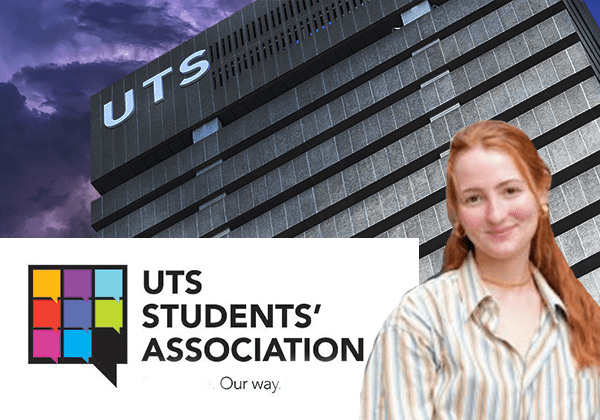The UTS Students’ Association (UTSSA) last night voted to dismiss Education Officer Ellie Woodward five days before the end of her term, and passed constitutional amendments that will make it easier to dismiss future councillors.
Woodward, alongside the UTS Education Action Group (EAG), has been involved in organising protests and rallies against staff cuts and job losses at UTS.
She has previously been sanctioned by the UTSSA for postering on campus, a standard activity in education activism, which was deemed as contempt for the UTSSA Constitution and the Association Code of Conduct.
“[This motion] is being painted as an issue of rule-following rather than democracy,” said Woodward. “It’s so crazy, so unprecedented and so undemocratic.”
Woodward has also been barred from “nominating or participating” in future elections in accordance with a clause in the UTSSA’s by-laws outlining the powers of the Grievance Committee, which was established this year as part of the Associations’s “disciplinary procedure”.
Education activist Vinil Kumar also noted at the meeting that not even USyd’s 2019 Liberal-dominated SRC moved to dismiss a sitting officer or prevent councillors from participating in future elections.
The UTSSA explained Woodward’s dismissal, in spite of her term ending on December 5, as setting a “precedent” for future councillors who do not act in accordance with the Association’s “rules”.
EAG member Holly Hayne raised concerns about the precedent Woodward’s dismissal will set for future councillors who disagree with a Unity-dominated Executive and its implications for democracy within the UTSSA.
At the time of writing, the UTSSA is led by President Aidan O’Rourke (Unity) and General Secretary Erin Dalton (NLS), who faced criticism earlier this year for censoring the EAG’s March 24 protest against course cuts and breaking collective autonomy.
“This is not just a factional fight… This is an issue of the right putting resources into preventing students from activism,” Hayne said.
The UTSSA also voted in favour of a number of constitutional amendments that will make it easier to remove elected student officials.
These include changing the voting requirements for a councillor’s dismissal from a two-thirds majority to a 51 per cent absolute majority, allowing councillors to be dismissed for remediable failures to comply with the UTSSA’s Code of Conduct, and permitting SRC vacancies to be filled “by the person elected to that position in that general election”.
Students have expressed concerns that the changes would hamper democratic proceedings with excessive bureaucracy, with first-time councillors who are adjusting to their roles at risk of dismissal for failing to complete administrative tasks such as accurately recording minutes.
Activists have also noted that changes to the voting requirements reflect Labor Unity and NLS’ shifting balance of power after the recent October elections resulted in more seats for left-wing Grassroots candidates and fewer seats for Labor.
“The amendments mean [that] next year Labor could dismiss their opponents and install themselves to positions they lost in the student election, effectively by-passing democracy,” said Hayne in a statement to Honi.
In Council discussions regarding the amendment on fulfilling vacancies, outgoing Indigenous Officer Zebadiah Cruickshank (NLS) implied that Labor councillors would “sack Anna [Thieben (Grassroots), incoming UTSSA President]” and install incoming General Secretary Sabrine Yassine (Unity) as President. Such comments have raised further concerns about the anti-democratic leanings of Labor student officials.
“What an appalling attack on student democracy and activism. Particularly in the context of historic attacks on education, we need a democratic students association that fights for students’ interests,” said Hayne.





